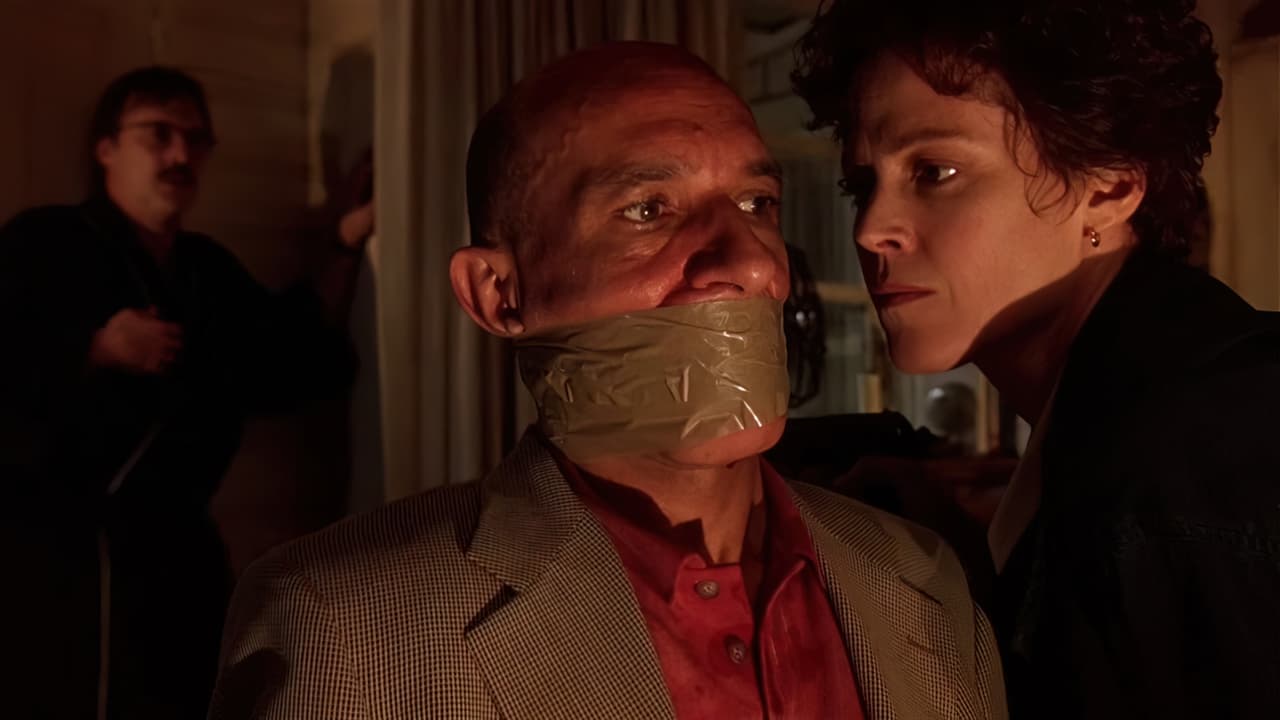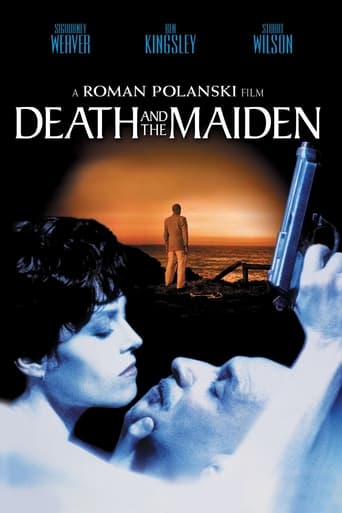

The greatest movie ever made..!
... View MoreGood films always raise compelling questions, whether the format is fiction or documentary fact.
... View MoreThe acting is good, and the firecracker script has some excellent ideas.
... View MoreActress is magnificent and exudes a hypnotic screen presence in this affecting drama.
... View MoreRoman Polanski does something that is not easy here: he transfers a play to the screen, and never lets you forget that it is a play you're watching, but he makes it completely cinematic at the same time. The play itself is a great enigma about truth, doubt, vigilantism and justice. I don't want to give away the ending, but it is masterfully designed and executed. It's an intense and compelling film, the kind that invites long debates after it's over. The three leads are perfectly cast: Weaver and Kingsley are at the peak of their powers, but Wilson is much more than just "a third wheel". *** out of 4.
... View MoreThe movie script of "Death and the Maiden" is originated from a screenplay with the same name by Ariel Dorfman from Chile. This script has a great structure. The wife is listening to the radio while cooking the dinner. The news on the radio tells about foundation of a committee for investigation about tortures and crimes of the previous dictatorship naming someone as the head of this committee. The unusual attention of the wife leads the movie viewers to suppose a relation between the wife and those phenomena. The electricity went off. The fear of the wife might be because of hearing the thunderstorm or remembering past horrors. The wife ran quickly to a battery radio to continue listening to the news. Here, the viewer became sure about the importance of the news. The nervous attitude of the wife, going under the rain, smoking a cigarette and taking a gun by seeing a coming vehicle, either show this. Then, something else happens. The husband introduces himself to the vehicle driver - the doctor- and the viewers figure out that he is the head of the committee. This causes the viewers to forget their previous conclusions and think that the main reason of the wife's reactions is hearing her husband's name. While thinking about this, the dialogs between the couple return the viewers back to the first conclusion. The movie keeps the viewers in a reciprocating situation, which continues along the story. The husband thinks he knows everything about his wife's prison but figures out it was not. The wife gains new information about a sexual relation between his husband and another girl during her prison time and the viewers us not sure about the guilt of the doctor. This uncertainty is smartly placed in the script. In the other side, the battery radio used to show the importance of the news in the beginning of the film, was utilized again in the middle to prove the crime of the doctor without any encounter to went off electricity and plays the "Death and the Maiden" piece to show the title of the film.
... View MoreA woman seeks revenge from a man she recognizes as a government official who tortured and raped her years ago for her political views. Based on a play, the setting could have been post-WWII Germany with a Jewish woman going against her Nazi persecutor. However, it is set in an unnamed South American country. There are only three characters and most of the action takes place on a single set, but Polanski manages to sustain the tension throughout. Weaver is convincing as the vengeful woman. Wilson and Kingsley are fine as her husband and the man she accuses of war crimes, respectively. The title comes from Schubert's 14th string quartet, which was played every time Weaver was raped.
... View MoreConsidering that this is a play and rather looks like one, it's pretty good. Well, it's good anyway.A lawyer, Gerardo (Stuart Wilson) and his wife Paulina (Sigourney Weaver) have just retired in their comfortable, isolated house next to a cliff overhanging the sea. The location is somewhere in South America, in a country that has just emerged from despotism and become a democracy. A car has trouble on the road in front of their house. Dr. Miranda (Ben Kingsley) rouses them and asks for help, but an electrical storm has knocked out both the power and the phone.Gerardo and Dr. Miranda are chatting in the living room while Paulina is still in bed. Hearing Miranda's voice, she sits up in alarm, sneaks outside, burns off in Miranda's car and pushes it over a cliff.That, I guess, is the end of Act I. Most of the time we spend with Gerardo and Miranda in the living room. The two men are at loose ends and drink themselves into a cheerfully befuddled state. I can't remember many drunk scenes better than this one. Kingsley, in particular, is given marvelous lines and delivers them as if they were gifts to the audience -- cynical, ironic, high brow, amiable. "I would like to quote Nietzsche in a situation like this," says Kingsley. "At least I think it was Nietzsche. Maybe it was Freud." Gerardo, "If you can remember a quotation, it's usually Freud." The dialog is delicious and matter of fact. The two men are sitting on the porch steps, still thinking Paulina is asleep, musing about where a thief might have driven Miranda's car, and why. "I'm an idiot," says Kingsley. "I'm running down the road yelling 'That's my car!' Of course the thief knows that. That's the whole POINT." Later, when they find out that Paulina has stolen the car, "I mean, what is this -- a regular thing or what? How long do you think we might have to wait? A day or two? A month?" Then the humor dwindles to a palpitating point and vanishes, and the movie becomes echt-serious. Paulina claims that Miranda worked as an interrogator for the now-deposed dictatorship and that he beat, tortured, and raped the women who were his prisoners -- Paulina included. (She's explicit about the techniques.) Gerardo thinks she's crazy. Miranda is astonished and scared to death.Paulina has Miranda tied up and puts him on trial, appointing Gerardo his defense counsel. Some "trial"! If Miranda confesses and shows genuine contrition she'll let him go, otherwise she'll shoot him through the head. Miranda, sensibly, is perfectly willing to confess and get out of this mad house but, since he claims to have had nothing to do with the previous regime, he doesn't know what to confess to. Paulina wants details -- what was she tied up with, ropes or wires? -- that Miranda says he is unable to provide.It's a harrowing movie, with occasional arcs of electricity jumping through it. I'm not certain the ending is played exactly as it would be in real life, but it hardly matters because the acting on the part of all three principals is unimpeachable.I don't want to give away the climax but I'll sum up my impression by saying that it's quite possible to be guilty OR innocent, while still being mad.See it if you can. It's a hard film to forget.
... View More